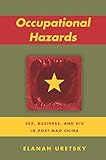Occupational hazards : business, sex, and HIV in post-Mao China / Elanah Uretsky.
Material type: TextPublication details: Stanford, California : Stanford University Press, (c)2016.Description: 1 online resourceContent type:
TextPublication details: Stanford, California : Stanford University Press, (c)2016.Description: 1 online resourceContent type: - text
- computer
- online resource
- 9780804797566
- RA643 .O238 2016
- COPYRIGHT NOT covered - Click this link to request copyright permission: https://lib.ciu.edu/copyright-request-form
| Item type | Current library | Collection | Call number | URL | Status | Date due | Barcode | |
|---|---|---|---|---|---|---|---|---|
 Online Book (LOGIN USING YOUR MY CIU LOGIN AND PASSWORD)
Online Book (LOGIN USING YOUR MY CIU LOGIN AND PASSWORD)
|
G. Allen Fleece Library ONLINE | Non-fiction | RA643.86.6 (Browse shelf(Opens below)) | Link to resource | Available | ocn931534224 |
Includes bibliographies and index.
Introduction : an epidemic at the margins of governance and governmentality -- The state, work, and men's health -- Constructing the "nanzihan" : hegemonic masculinity in urban China -- New China, new life ... sex included : negotiating private lives and public discourse in post-Mao urban China -- Negotiating risk and power : the role of sexual scripts and networks in HIV transmission -- Tracing the development of China's HIV -- Engineering a local response to a global pandemic in China -- Conclusion : going beyond the evidence.
"Doing business in China can be hazardous to your health. Occupational Hazards follows a group of Chinese businessmen and government officials as they conduct business in Beijing and western Yunnan Province, exposing webs of informal networks that help businessmen access political favors. These networks are built over liquor, cigarettes, food, and sex, turning risky behaviors into occupational hazards. Elanah Uretsky's ethnography follows these powerful men and their vulnerabilities to China's burgeoning epidemics of sexually transmitted infections (STIs) and HIV/AIDS. Examining the relationship between elite masculine networking practices and vulnerability to HIV infection, Occupational Hazards includes the stories of countless government officials and businessmen who regularly visit commercial sex workers but resist HIV testing for fear of threatening their economic and political status. Their fate is further complicated by a political system that cannot publicly acknowledge such risk and by authoritative international paradigms that limit the reach of public health interventions. Ultimately, Uretsky offers insights into how complex socio-cultural and politico-economic negotiations affect the development and administration of China's HIV epidemic."
COPYRIGHT NOT covered - Click this link to request copyright permission:
There are no comments on this title.
